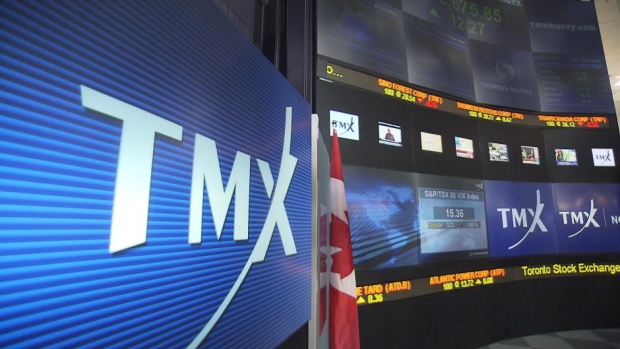Apr 26, 2017
TSX slips as oil prices slide, Home Capital slumps
, Reuters

Canada's main stock index pulled back on Wednesday from a two-month high the day before, pressured by a plunge in the shares of Home Capital Group Inc (HCG.TO) and investor worries about Canada's trade relationship with the United States.
The White House is considering a draft executive order to withdraw the United States from the North American Free Trade Agreement, a trade pact with Canada and Mexico, a senior Trump administration official said.
"I think they're [investors] being a little cautious about Mr Trump and maybe what he is going to do to Canada," said John Kinsey, portfolio manager at Caldwell Securities.
U.S. President Donald Trump has recently ramped up criticism of Canada, saying last week that Ottawa's protection of its dairy industry was "unfair." This week he ordered 20-per-cent tariffs on imports of Canadian softwood lumber.
Home Capital plunged nearly 65.0 per cent to $5.99 after the alternative lender said it would secure a $2-billion credit line to shore up its shrinking balance sheet.
The overall financials group declined 1.3 per cent even as the Trump administration proposed slashing business taxes, which could provide a boost to some Canadian banks that have operations in the United States.
Toronto-Dominion Bank (TD.TO) fell 1.5 per cent to $65.77.
Other influential decliners included Burger King and Tim Horton parent Restaurant Brands International (QSR.TO), which fell 2.9 per cent to $77.02 despite reporting profit and revenue that beat expectations.
The energy group retreated 1.1 per cent even as oil prices rebounded from early losses after U.S. government data showed a larger-than-expected falloff in crude inventories.
U.S. crude oil prices settled six cents US higher at US$49.62 a barrel.
The Toronto Stock Exchange's S&P/TSX composite index closed down 95.65 points, or 0.61 per cent, at 15,649.54. Five of its 10 main groups ended lower.
Shares of BCE Inc (BCE.TO) advanced 1.7 per cent to $62.70 after Canada's largest telecommunications company reported a better-than-expected quarterly profit, driven by an increase in net postpaid subscribers.
Teck Resources Ltd (TECKb.TO) advanced 0.5 per cent to $28.97 after it said it will double its dividend payout.
Canadian retail sales fell more than expected in February, dragged down by lower vehicle purchases and cheaper prices for gasoline at the pump, but the decline did not alter expectations for strong economic growth in the first quarter.
U.S. MARKETS
U.S. stocks ticked lower on Wednesday following two sessions of strong gains as strong corporate earnings were offset by uncertainty over the feasibility of a proposed business tax cut.
The proposal from the Trump administration slashes tax rates for businesses and on overseas corporate profits returned to the country. It offered no specifics on how it would be paid for without increasing the deficit.
"A lot to digest on the tax side and to be honest we don't have a lot of details at this point aside from just a few bullet points from the press conference," said David Lefkowitz, senior equity strategist at UBS Wealth Management Americas in New York.
"This is going to be a bit of an uphill fight to get this plan enacted into law."
The expectation of a corporate tax cut was partly behind the rally in U.S. stocks since the November election of Donald Trump. The market stalled over the last several weeks as the administration has failed to score a major legislative victory, Republican majorities in the House and Senate notwithstanding.
The S&P 500 traded above its record closing high throughout the day, however. Some analysts say even though tax reform would be a major boost to stocks, economic and earnings growth are enough to support current market levels.
Overall profits of S&P 500 companies are estimated to have risen 11.8 per cent in the first quarter, the most since 2011, according to Thomson Reuters I/B/E/S.
The Dow Jones Industrial Average fell 21.03 points, or 0.1 per cent, to 20,975.09, the S&P 500 lost 1.16 points, or 0.05 per cent, to 2,387.45 and the Nasdaq Composite dropped 0.27 point to 6,025.23.
Despite the tick lower, advancing issues outnumbered declining ones on the NYSE by a 1.37-to-1 ratio; on Nasdaq, a 1.62-to-1 ratio favored advancers.
The tax proposal includes a cut on so-called pass-through business taxes that would deliver a windfall to investors in MLPs, master limited partnerships.
Among stocks, United Technologies rose 1.1 per cent to US$118.20 and provided the biggest boost to the Dow industrials after reporting a quarterly profit that beat expectations helped by higher sales in all four of its business units.
"Earnings are very strong, you could see a 15 per cent year-on-year growth on the S&P," said Paul Zemsky, chief investment officer, Multi-Asset Strategies and Solutions at Voya Investment Management in New York.
"We're seeing a global, synchronized up swing."
On the flip side, Boeing shares fell about one per cent to US$181.71 after the planemaker reported a decline in revenue.
The S&P 500 posted 82 new 52-week highs and three new lows; the Nasdaq Composite recorded 210 new highs and 28 new lows.
About 7.33 billion shares changed hands in U.S. exchanges, compared with the 6.44 billion daily average over the last 20 sessions.






